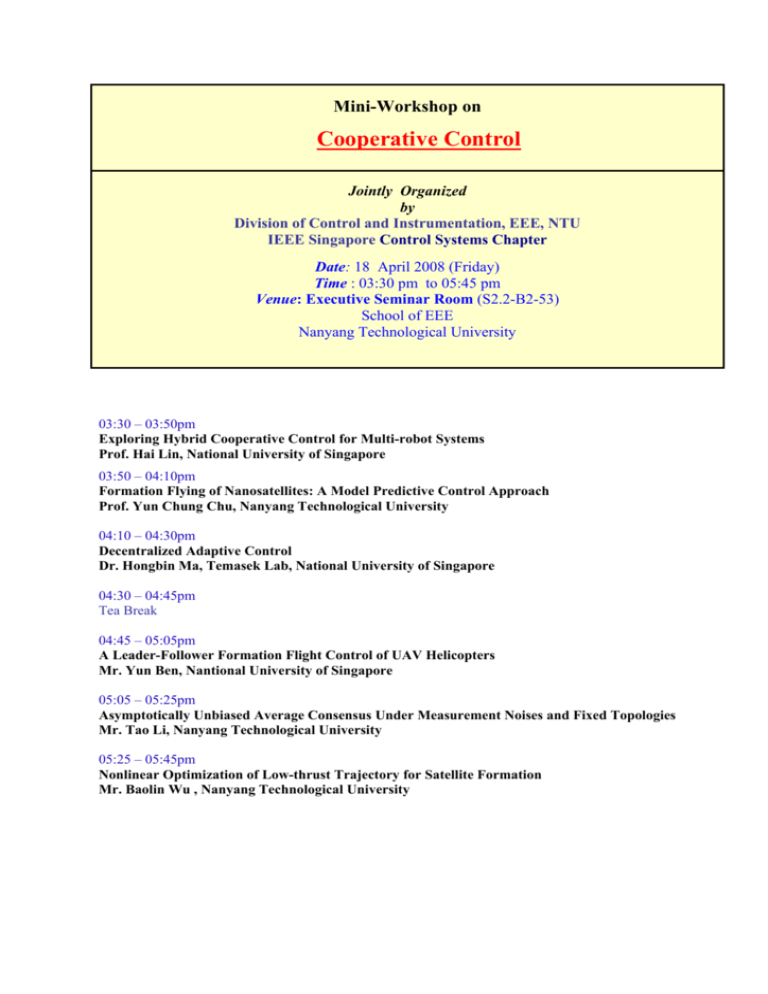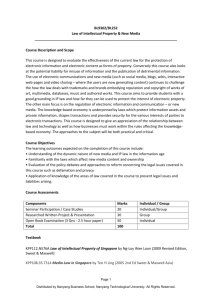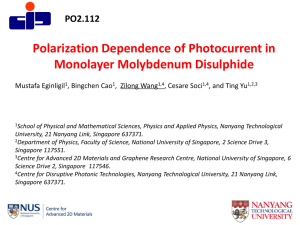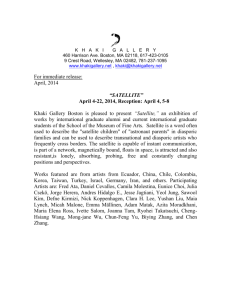Mini-Workshop on Cooperative Control - NUS UAV
advertisement

Mini-Workshop on Cooperative Control Jointly Organized by Division of Control and Instrumentation, EEE, NTU IEEE Singapore Control Systems Chapter Date: 18 April 2008 (Friday) Time : 03:30 pm to 05:45 pm Venue: Executive Seminar Room (S2.2-B2-53) School of EEE Nanyang Technological University 03:30 – 03:50pm Exploring Hybrid Cooperative Control for Multi-robot Systems Prof. Hai Lin, National University of Singapore 03:50 – 04:10pm Formation Flying of Nanosatellites: A Model Predictive Control Approach Prof. Yun Chung Chu, Nanyang Technological University 04:10 – 04:30pm Decentralized Adaptive Control Dr. Hongbin Ma, Temasek Lab, National University of Singapore 04:30 – 04:45pm Tea Break 04:45 – 05:05pm A Leader-Follower Formation Flight Control of UAV Helicopters Mr. Yun Ben, Nantional University of Singapore 05:05 – 05:25pm Asymptotically Unbiased Average Consensus Under Measurement Noises and Fixed Topologies Mr. Tao Li, Nanyang Technological University 05:25 – 05:45pm Nonlinear Optimization of Low-thrust Trajectory for Satellite Formation Mr. Baolin Wu , Nanyang Technological University Abstract and Biographies of Speakers Exploring Hybrid Cooperative Control for Multi-robot Systems Prof. Hai Lin, NUS Abstract: Nowadays, it becomes possible to deploy hundreds and even thousands of small and inexpensive ground, air, and under water robots. Although each individual robot could be very rudimentary with very limited capabilities, however the large collection of these robots, as a whole, may exhibit remarkable capabilities and display highly complex behaviors. Most of the exciting research activities so far have been focused on understanding how global behavior is generated from local interactions among these robots. However, a more important question is how to design these local interaction rules such that certain desired global behaviors can be achieved. The control of such large scale complex systems poses several new challenges that fall beyond the traditional methods and calls for new frameworks and approaches. This talk aims to share some thoughts and viewpoints from the perspective of hybrid systems and symbolic control. In particular, we will describe our research thrust in developing a formal design method for distributed coordination and control of multi-robot systems. The stages of the research effort and corresponding challenges are briefed. Then, the talk finishes with discussions on our current on-going research activities along this direction. Speaker: Dr. Lin Hai is currently an assistant professor in the National University of Singapore, Electrical and Computer Engineering Department. He received the B.S. degree from University of Science and Technology, Beijing, China in 1997, the M.Eng degree from Chinese Academy of Science, China in 2000, and the Ph.D. degree from the University of Notre Dame, USA in 2005. His research interests are in the multidisciplinary study of the problems at the intersection of control, communication, computation and life sciences. He is particularly interested in hybrid systems theory, networked systems, and systems biology. Formation Flying of Nanosatellites: A Model Predictive Control Approach Prof. Yun Chung Chu, NTU Abstract: In this talk, the formation keeping of nanosatellites in eccentric earth orbits is considered. The overall control design follows a non-hierarchical control architecture based on the virtual structure approach. For the local level control, the linear parameter varying model describing the relative motion of member satellites is approximated by an uncertain model with polytopic uncertainties. An infinite-horizon robust MPC is then used to handle the model uncertainties as well as the state and control constraints while minimizing the fuel requirement. In addition, a scheme for switching on/off of the individual satellite controllers for minimizing overall fuel consumption is explored. The performance of this control strategy is studied with an extensive nonlinear satellite formation simulation. Simulation results show the effective performance of the overall control strategy. Speaker: Dr. Y. C. Chu received the B.Sc. degree with first class honours in Electronics and the M.Phil. degree in Information Engineering from the Chinese University of Hong Kong, Hong Kong, in 1990 and 1992 respectively, and the Ph.D. degree in Control from the University of Cambridge, U.K., in 1996. He worked as a Postdoctoral Fellow at the Chinese University of Hong Kong in 1996-97, a Research Associate at the University of Cambridge in 1998-99, and is currently an Associate Professor in the School of Electrical and Electronic Engineering, Nanyang Technological University, Singapore. His research interests are control theory and artificial neural networks, with applications to spacecraft, nanoelectronics, optical sensing, combustion oscillations and power systems. Decentralized Adaptive Control Dr Hongbin Ma, Temasek Lab@NUS Abstract: In this talk, we shall briefly introduce some of our work on decentralized adaptive control, including the motivations of our work, the theoretical problem framework, and two concrete examples that we have studied. Some conceptual ideas will be demonstrated although only very basic issues are discussed and many challenging issues are still left for consideration in the future. Speaker: Hongbin Ma was born in 1978, in China. He received the B.Sc. degree in Mathematics from Zhengzhou University, China, in 2001 and the Ph.D. degree in Control Theory and Operational Research from Institute of Systems Science, Academy of Mathematics and Systems Science, Chinese Academy of Sciences, in 2006. Currently he is a research scientist in Temasek Laboratories, National University of Singapore. His research interests include dynamical games, pursuit and evasion, stochastic control systems, adaptive estimation and control, hybrid systems and multi-agent dynamical systems. A Leader-Follower Formation Flight Control of UAV Helicopters Mr. Yun Ben, Nantional University of Singapore Abstract: Cooperative control of unmanned vehicles has received significant interest due to a variety of applications. Autonomous UAV is capable of accomplishing important missions while reducing risk to personnel. The advantages of small-scale helicopters for UAV research include their agility and their vertical takeoff and landing capability. Moreover, the ability to hover is useful in many applications. Along with these advantages come several characteristics that make small-scale helicopters difficult to model and control. Specifically, the dynamics are nonlinear, unstable, and subject to complex aerodynamic effects. In this talk, through theoretical analysis and formula deduction, a simple formation dynamic model for the wing UAV in a leader-follower formation flight scheme is developed. In the formation control algorithm, only the leader periodically broadcasts its position and velocity (or velocity reference) to the other vehicles that are commanded to maintain a fixed separation from the leader while following a prescribed trajectory. To avoid collision between formation team members, we proposed a hybrid decision making scheme, which is verified in simulation. An experiment with a virtual leader via wireless communication shows the overall formation scheme yields a good performance. Speaker: Mr. Yun Ben received his B.Sc and M.Sc. in Control Engineering from Harbin Institute of Technology in 1997 and 2000, respectively. After graduation, he worked at Beijing Institute of Control Engineering (BICE), Chinese Academy of Space and Technology (CAST). He is currently studying towards his Ph.D. in Electrical and Computer Engineering at National University of Singapore. His current research interests include sensor fusion, formation flight control of multiple unmanned aerial vehicles. He is a student member of IEEE. Asymptotically Unbiased Average Consensus Under Measurement Noises and Fixed Topologies Mr Tao Li, EEE, NTU Abstract: This work is concerned with average-consensus control under directed topologies and random measurement noises. To attenuate the measurement noises, time-varying consensus gains are introduced in the protocol. It is shown that under the protocol designed, all agents' states converge to a common Gaussian random variable, whose mathematical expectation is just the average of the initial states, and the mean square static error vanishes as the number of agents increases to infinity under certain topologies. In addition, for the noise-free case, necessary and sufficient conditions are given on the network topology and consensus gains to achieve average-consensus; and for the noisy measurement case, by combining algebraic graph theory and stochastic analysis, necessary and sufficient conditions are given on the consensus gains to achieve asymptotically unbiased mean square average-consensus. Speaker: Tao Li was born in Tianjin, China, in 1981. He received the B.S. degree in Automation from Nankai University, Tianjin, China, in 2004. Now he is a Ph.D. candidate of Academy of Mathematics and Systems Science, Chinese Academy of Sciences, Beijing, China. His current research interests are system modeling, stochastic systems and multi-agent systems. Nonlinear Optimization of Low-thrust Trajectory for Satellite Formation Mr. Baolin Wu , Nanyang Technological University Abstract: In this talk, we focus on the design of fuel-optimal maneuver strategy to reconfigure satellite formation using low thrust propulsion system. We cast it as an optimization problem with a desired final satellite formation configuration subject to collision avoidance constraints on the paths of the chief and all deputy satellites. The satellite terminal orbit states corresponding to this desired satellite formation are ensured by including energy-matching condition and final geometry configuration constraints in the problem formulation. In addition, we adopt our recently developed relative satellite kinematics model to accurately describe relative satellite orbit geometry in the presence of J2 effects. The resulting nonlinear optimal control problem is converted into a nonlinear programming problem by application of Legendre pseudospectral method and is solved using a sparse nonlinear optimization algorithm named SNOPT. Simulation results demonstrate the efficiency of our method in designing fuel-optimal satellite maneuvers for several formation reconfiguration problems. Speaker: Baolin Wu received the BS and the MS degrees from the Harbin Institute of Technology, Harbin, People’s Republic of China, in 2003 and 2005, respectively. He is now completing the PhD degree in the Aerospace Electronics Lab, School of Electrical and Electronics Engineering, Nanyang Technological University, Singapore. His current research interests are in the area of optimal control, and satellite formation control.






